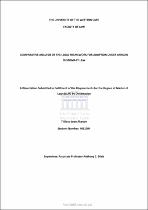| dc.description.abstract | While there is a comprehensive legal framework for the adoption of children under statutory
law in Nigeria, South Africa, and Botswana, there is far less clarity on customary law adoption.
This study explored how the legal framework of these countries provide for customary law
adoption. It also examined the extent to which the rights of adopted children are protected,
as mandated by international and regional human rights instruments. The study reveals that
the legislative framework on adoption in the sampled states does not formally accommodate
customary law adoption. Many children in these countries live in rural communities practicing
customary law, with the majority of them being born in families that struggle with poverty
and gender inequality. The violation of fundamental human rights of children adopted under
customary law in some Nigerian communities is treated with contempt. | en_US |

